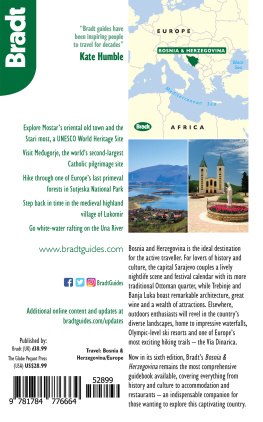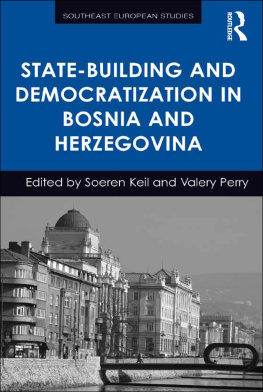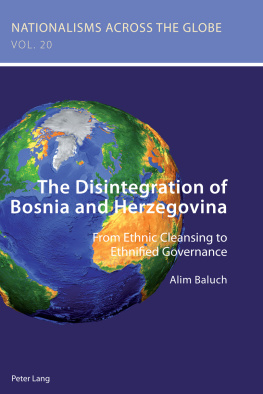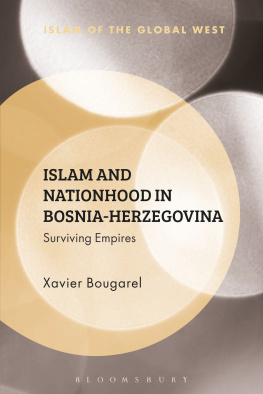Illustrations
. Cover of Zihad Kljuanin and Hazim Akmadi, Zloin je zaboraviti zloin! Sanski Most u ratu, 19921995. Svjedoenja/Documenti. (It Is Criminal to Forget Evil! Sanski Most in the war, 19921995. Witness statements/documents).
. Photograph of an interaction between returning refugees and the US ambassador to Bosnia and Herzegovina Clifford Bond in the Stari Grad neighborhood in the town of Prijedor, a site of significant refugee return.
. Photograph of article: Senad Peanin, Ivan Lovrenovi, Nerzuk urak, and Mile Stoji, Deset teza za Bosnu i Hercegovinu (Ten theses for Bosnia and Herzegovina), Dani. 139 (January 28, 2000), 1617. Article addressed to High Representative Wolfgang Petritsch.
. First page of article by High Representative Wolfgang Petritsch, Ovo nije naa zemlja (This is not our country), Dani. 144 (March 3, 2000), 23.
. Photograph of a refugee return site in the town of Prijedor prior to the reconstruction of houses.
. Photograph of a refugee return site in the town of Prijedor after housing reconstruction had begun.
Acknowledgments
This book has been a long time in the making, and my list of debts both scholarly and personal is long and stretches back well over a decade. It must begin in Bosnia and Herzegovina, which is rightly famous for the generosity and warmth of its people, and this must be infectious, because I experienced it equally among Bosnians and foreigners alike. In Sarajevo, for their generous hospitality and willingness to share their time and particularly their space with me, I thank Tobi and Milena, Massimo, Peter, Bodo and Azra, Rhodri, and Erika.
Intellectual solidarity is not always easy to come by in Bosnia, making the friendship and collegiality of Nerzuk, Dino, and Asim all the more important. Miodrag ivanovi deserves special recognition for the oasis of sanity and good humor he provided for me in his office at the Filozofski fakultet at the University of Banja Luka.
My research would not have even gotten off the ground if the staff of a wide variety of international organizations had not taken time out of their days to answer my questions. The staff of the Reconstruction and Return Task Force at various offices of the Office of the High Representative (OHR) in northwestern Bosnia were quite helpful, in particular Lawrence, Michelle, and John. The same goes for the staff at the UNHCR field office in Prijedor. Conversations and field trips with the staff of the numerous nongovernmental organizations active in northwestern Bosnia were invaluable in revealing the scale and depth of the refugee return process, and their good will and openness to my constant queries were much appreciated. These include those working for World Vision, Catholic Relief Services, United Methodist Committee on Relief, Technisches Hilfswerk, Dorcas Aid, International Orthodox Christian Charities, Swiss Caritas, and Lutheran World Federation. The staff at the Prijedor and Sanski Most field offices of the Organization for Security and Co-operation in Europe (OSCE) deserve special recognition for allowing me to be present at numerous meetings, for their openness and their friendship. The many insights gained in this book would have been impossible without them.
For my understanding of the basic dilemmas and politics of refugee return in Prijedor, I must thank the patient staff of the Fondacija za obnovu i povratak Prijedor 98: Gorana, Sead, Anel, Emira, Mirjana, ela, Sanela, and Mirsad. Among other returnees to Prijedor, my conversations with Muharem, Nusreta, and Nijaz were particularly useful. In Sanki Most, Vukica, uro, Slobodan, and Gojko stood out as valuable interlocutors, and helped facilitate my understanding of returnee issues there.
In Prijedor, it would be almost impossible to overestimate my personal debt to the Grahovac family: Mladen, Amira, Vedran, Dijana (and Sandi!). They provided a home away from home for me in Bosnia, and I cannot put into words what their friendship, warmth, and humanity meant to me.
The nature of fieldwork means that most anthropologists in one fashion or another come to rely heavily on others, as participants, cultural brokers, gateways to important social networks, and as guides in navigating the wilds of foreign bureaucracies. Often one or two people emerge as vital in this regard, and for me this was person was Zoran Ergarac. His friendship, his intelligence, his openness, and his willingness to help me with almost everything were indispensable during my field research.
I owe much to Susan Gal, as well as to John Comaroff, John Kelly, and Victor Friedman for their mentorship while I was at the University of Chicago. In important ways my first real engagement with Bosnia and Yugoslavia began with Nada Petkovi, language instructor and friend, and I thank her for the lengths she went to make my research possible, from classroom time to facilitating some of my first contacts in Sarajevo and Banja Luka. Other valuable interlocutors in Chicago include Anya Bernstein, Larisa Jaarevi, Andy Graan, Mike Cepek, and the many members of the Anthropology of Europe Workshop. Jessica Greenberg has been a treasured friend, colleague, and intellectual companion for the better part of the last two decades.
Early in my experience at the University of Toronto I was introduced to Edith Klein at the Centre for European, Russian and Eurasian Studies, and I thank her for the support and opportunities she opened up for me as a newcomer to Canadian academia. I am also grateful for the writing time and support afforded me by my colleagues in the Department of Anthropology at McMaster University.
Various ideas in this book were first tried out at conferences and in conversations too numerous to list here, but at one time or another the comments and engagement of Katherine Verdery, Elizabeth Dunn, Susan Woodward, Keith Brown, Chip Gagnon, Kim Coles, Bob Hayden, Elissa Helms, Stef Jansen, Bodo Weber, and Tobi Vogel stand out as particularly valuable. I treasure the conversations with participants in the 2013 workshop Towards an Anthropology of International Intervention: Greg Beckett, Bianca Dahl, Anila Daulatzai, Antonio de Lauri, Andrew Graan, Jesse Grayman, Pierre Minn, and Vivian Solana.
Principal funding for my research on international intervention in Bosnia came in the form of fellowships and scholarships from the International Research & Exchanges Board (IREX) and American Councils ACTR/ACCELS. Fellowships from the American Council of Learned Societies and Harry Frank Guggenheim Foundation provided valuable time to write up that research, and small grants from the Woodrow Wilson International Center for Scholars and the Russian, East European, and Eurasian Center at the University of Illinois, Urbana-Champaign provided important opportunities to share my research findings. Most of this list of diverse funding sourcesincluding a scholarship that supported an intensive summer introduction to the Serbo-Croatian language (as it was still called then)was supported by US state resources aimed at developing and enhancing area studies knowledge and expertise, much of it focusing on Eastern Europe and the Balkans. Despite its complicated origin in the Cold War, area studies funding has been indispensable in producing a large repository of valuable knowledge and critical scholarship, and in supporting the careers of generations of scholars. For well over a decade now, such funding has been repeatedly slashed in a succession of federal government budgets. Witnessing this has made me even more grateful for the support I received, even as I lament the short-sighted, even dangerous, lack of investment in future generations.







